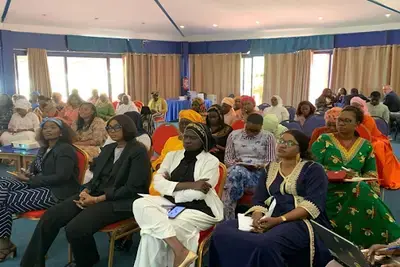
Success Story
Dismantling Beliefs and Attitudes to Advance the Inclusion of Persons with Albinism IDPD Partner Profile: Albinism Society of Kenya
In support of NDI’s commitment to increasing the inclusion of marginalized populations in political processes, we’re highlighting the essential work of partners who are at the forefront fighting for greater levels of equality, shifting norms and perceptions, and reducing barriers to political participation for persons with disabilities.
NDI interviewed the Albinism Society of Kenya (ASK), a partner working to bring together persons with albinism to advance their rights and live in a society free from prejudice and discrimination. ASK told us how they are raising the visibility of persons with albinism within the broader disability rights movement in Kenya and partner with other albinism groups to mitigate harmful stigmas and cultural beliefs.
What does accessibility mean to you and/or your organization?
Accessibility means having the right to fully participate in community life. Additionally, the concept of accessibility to us focuses on enabling access through assistive technology and making public spaces and facilities physically accessible for all.
Describe some of the ways that people with disabilities in your country are participating politically. What challenges or barriers to political participation remain?
Persons with disabilities in our country are participating politically through vying for political seats and participating in electoral processes. We have examples of people like Timothy Aseka, a person with albinism serving as both a county assembly member in Kakamega County as well as on the Kakamega County Disability Caucus. Martin Wanyonyi, also a person with albinism, is currently a member of the Bungoma County Assembly. Both Martin and Timothy got their start working for ASK.
A major challenge to political participation for persons with albinism is lack of access to information in accessible formats. Many persons with albinism are blind or have low vision and materials available on political processes fail to meet their needs because fonts are too small. Another barrier is lack of financial resources to vie for political positions. Politics is costly and most persons with disabilities do not have resources to fund their political ambitions.
How is your organization working to address these barriers/challenges and to eliminate discrimination against persons with disabilities in your country?
The organization focuses on raising awareness and sensitizing the public on issues related to albinism. We realized the first step to creating a conducive environment for persons with albinism who are vying for various elected positions, is to demystify the myths around albinism. The other way we are addressing these challenges is by providing information on how electoral information materials can be made more accessible.
As the world continues to battle COVID-19 almost two years later, has the pandemic presented any opportunities for your organization and/or for persons with disabilities in your country?
There have been very few opportunities at this point in the pandemic as the coronavirus continues to impact the socioeconomic situations of persons with albinism and with disabilities. Persons with albinism were scapegoated as carriers and spreaders of the virus resulting in many persons with albinism losing their jobs and no longer being able to afford basic needs and healthcare. This impacted greatly the quality of life of persons with albinism this last year and a half.
In the past year, can you briefly share a success story from your organization’s contribution to strengthening the disabled persons movement in your country or within your region?
Most recently, ASK partnered with two albinism organizations in the region including Source of the Nile Union of Persons with Albinism in Uganda and the Brigitte Alfred Foundation in Tanzania to jointly host the Mr. and Miss Albinism East Africa pageant. Through pageants, young people with albinism gain a space to interact and elevate their leadership and visibility as role models. Pageants are also successful in creating spaces in which society can interact directly with issues related to albinism, resulting in the dispelling of harmful myths and cultural beliefs.
What impact has NDI’s partnership had on your organization?
Our partnership with NDI has impacted us positively. We were able to audit the National Sunscreen Support Programme which is an important program that provides, free of charge, sunscreen and protective clothing, dermatological support, and after sun exposure lotions to persons with albinism to help prevent skin cancer. Through the audit, ASK was able to identify gaps in service provision and access and advocate for improved service delivery. This support helped to build stronger relationships with government entities and better understand the needs of persons with albinism as it relates to protecting themselves from the sun.
Additionally, through NDI’s support, ASK has been able to improve its overall organizational capacity. Most recently ASK was able to convene its county representatives from all 47 counties to strengthen internal communications and networks among representatives. This will enable ASK to ensure a better flow of information between the counties as well as between the counties and Nairobi-based staff to ensure activities are informed by the needs of persons with albinism across all counties. NDI has also supported ASK to build relationships with a broader group of disabled persons organizations in Kenya, enabling us to identify allies and better integrate albinism issues into the disability rights movement.
NDI is a non-profit, non-partisan, non-governmental organization that works in partnership around the world to strengthen and safeguard democratic institutions, processes, norms and values to secure a better quality of life for all. NDI envisions a world where democracy and freedom prevail, with dignity for all.



